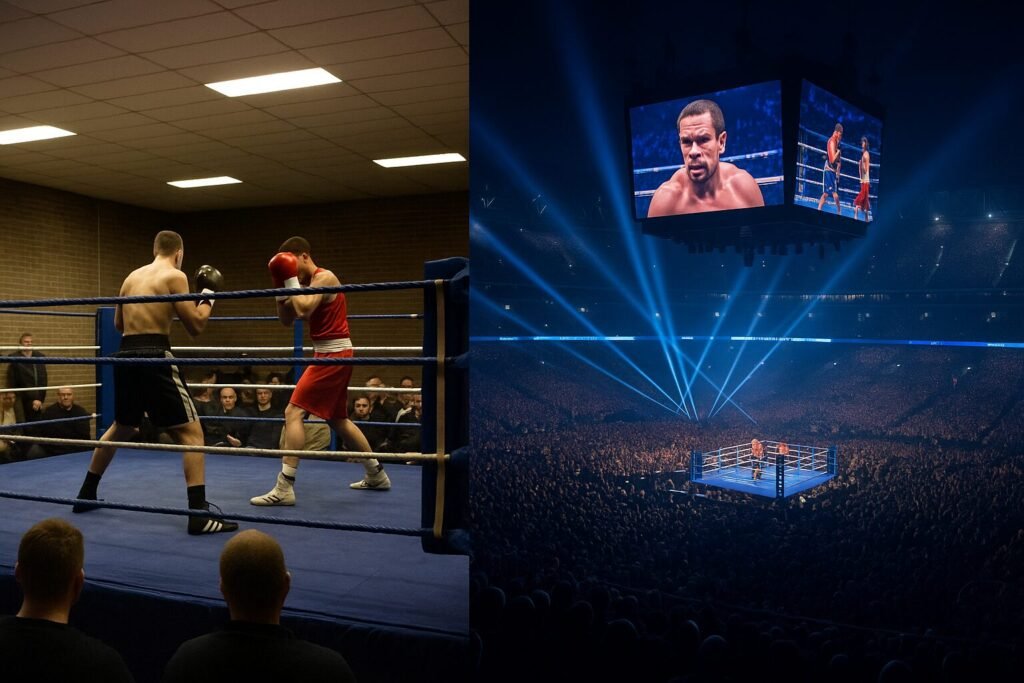The Beating Heart of the Sport
In the headlines, boxing today feels like a different world. Saudi Arabia bankrolls heavyweight mega-cards, Netflix experiments with crossover shows, and YouTubers dominate the chatter. But if you peel all that back, the soul of British boxing doesn’t live in Riyadh, Vegas, or streaming platforms. It lives in the small halls dotted across Britain.
From town leisure centres to working men’s clubs, these modest venues are where fighters cut their teeth, where journeymen keep careers alive, and where fans turn up not for fireworks but for honest fights. This is British grassroots boxing, and without it, the sport would collapse.
Fighters With Day Jobs and Big Dreams
Step into a small-hall dressing room and you’ll quickly see the difference. Most fighters aren’t surrounded by entourages or stylists. They’ve worked all week—labourers, teachers, delivery drivers—before shifting gears into fight mode.
For them, boxing is both passion and sacrifice. They don’t fight for million-pound purses; they fight for the chance to keep the dream alive, to move a step closer to the spotlight, or simply because they love it. Some see it as a serious profession, others treat it much like white-collar boxing—a test of themselves, a lifestyle, even a kind of addiction.
Journeymen: The Backbone of the Game
One night, at a small-hall show I attended, I spoke to a fighter who had stepped through the ropes more than 300 times. His record? A handful of wins against a mountain of losses. I asked him why he kept doing it—why take another fight, another shot, another risk?
His answer was simple: “It pays the bills. And I enjoy it. My job is to give these young prospects a proper workout.”
That’s dedication. That’s the side of boxing fans rarely see. Journeymen like him are the backbone of British grassroots boxing. They might not win often, but they’re vital for testing upcoming prospects, for toughening them up, for teaching them lessons that can’t be learned in sparring. Without these fighters, prospects would have nowhere to prove themselves.
It’s easy to dismiss a journeyman’s record. But if you’ve ever watched one push a touted young fighter to the limit, you’ll know their value. They’re as much a part of the sport’s fabric as the champions.
Where Careers Begin (and Sometimes End)
Every superstar you know—Ricky Hatton, Joe Calzaghe, Carl Froch, Tyson Fury—started on the small-hall circuit. None of them were born into sold-out arenas; they fought in leisure centres with sticky floors, where ticket money changed hands in envelopes and ring walks were soundtracked by cheap speakers.
That conveyor belt of talent is what keeps British boxing strong. Without it, the next generation dries up. For every Hatton or Froch, there are dozens who never make it past the small-hall stage. Some accept that reality; others chase the dream until their bodies won’t let them anymore. But all of them matter. They’re the reason the sport survives from the ground up.
More Than Just Fights
I’ve been in arenas with 20,000 fans, pyros blasting, and the whole show streaming worldwide. And I’ve been at a small-hall with maybe 100 people in the crowd—if you can call it a “crowd.” And honestly? Sometimes the smaller nights win.
In a stadium, the undercard often drifts by half-watched, with fans waiting for the main event. In a small-hall, every single fight matters, because every single fighter has sold tickets personally. The crowd isn’t there for celebrity—they’re there for their mate, their cousin, their work colleague. It creates an intensity you can’t fake.
You hear every instruction from the corners, every glove landing, every intake of breath. The noise isn’t polished—it’s raw, passionate, and informed. These fans know their boxing. They spot when a jab’s sharp, when a fighter’s fading, when a young prospect is the real deal.
And after the fights, you don’t see limos and VIP exits. You see fighters at the bar with fans, sharing a pint, shaking hands, swapping stories. It’s grassroots sport at its purest.
Promoters Who Keep It Alive
Small-hall promoters don’t have Saudi money behind them. They don’t have Sky or DAZN cameras on standby. What they do have is graft. They’re selling tickets door-to-door, chasing down sponsors, convincing venues to host shows, and somehow balancing the books so fighters can get paid.
Without them, there’s no British boxing system. They are the matchmakers, the hustlers, the believers who keep the base of the pyramid standing tall. The mega-events wouldn’t exist without the small ones feeding them.
Why It Still Matters
In a fractured sport where belts multiply and spectacle often outweighs substance, small-hall boxing offers a reminder of why people fell in love with the game. It’s real. It’s unpolished. It’s fighters giving everything for pride, progress, or simply to keep the lights on.
Without British grassroots boxing, there’s no Anthony Joshua. No Tyson Fury. No Savannah Marshall or Natasha Jonas. There’s just empty arenas waiting for stars who never got their chance.
Your Ringside Seat
If you’ve never been to a small-hall show, put it on your list. Tickets are usually affordable, the atmosphere is unforgettable, and you’ll see boxing in its most honest form. You might even spot the next world champion years before the rest of the world knows their name.
Have you ever been ringside at a small-hall? Seen a journeyman take a young prospect the distance? Share your story in the comments—and explore more opinion pieces at CMBoxing.

